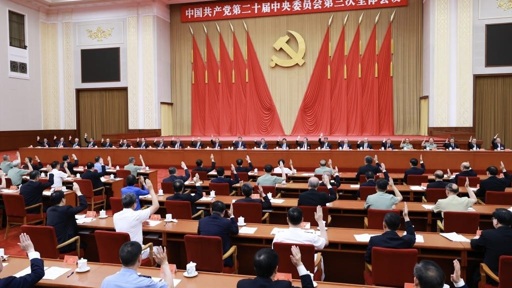The Fourth Plenary Session of the 20th Central Committee of the Communist Party of China (CPC) began this Monday, October 20, in Beijing, with the agenda focused on drafting proposals for the 15th Five-Year Plan (2026-2030) for the country’s economic and social development.
The discussion of the five-year plan at the Fourth Session represents a change in the usual calendar, as this discussion normally takes place at the Fifth Plenary Session. The change may have occurred due to the delay of the Third Plenary Session, which did not take place until August 2024. Following the usual calendar, it was expected to take place in 2023.
Xi Jinping, as general secretary of the Party, delivered the work report of the Political Bureau and explained the basic document of the new five-year plan to the approximately 200 members of the Central Committee.
The plenary session will run until Thursday, October 23, and will study the guidelines for Chinese development in the critical period before 2035. For that year, China aims to achieve “ basic socialist modernization ”.
After the meeting, the plan’s proposals will be released, and the final version is expected to be submitted to the National People’s Congress for approval in March 2026.
The document should establish that innovation drives the country’s development, with an emphasis on industrial modernization and strengthening the real economy, in addition to defining goals for economic growth, technological advancement, and social well-being.
The third session’s goals for 2029
The Third Plenary Session of the 20th Central Committee, held in August last year, adopted a 60-article resolution establishing more than 300 specific measures to deepen reforms by 2029, when the People’s Republic of China will turn 80. The document sets goals in areas such as education, fiscal structure, science, technology, and military modernization.
The goals include the development of “new-quality productive forces“, establishing mechanisms to guarantee financing for future industries such as artificial intelligence, aerospace aviation, new energy sources, and quantum technology. The resolution also provides for changes to the financial system to foster scientific and technological innovation, focusing on national programs and small and medium-sized enterprises.
In an interview with Brasil de Fato at the time, Li Xuesong, director of the Institute of Quantitative and Technological Economics at the Chinese Academy of Social Sciences, stated that a central guideline is to shift from prioritizing “investment in physical capital” to “investing in people and physical capital equally,” strengthening education, health, and social security.
The 15th Five-Year Plan period will coincide with the completion of these more than 300 reform tasks, establishing continuity between the decisions of the Third Session in 2024 and the medium-term planning that will now be defined at the Fourth Session.
Five-year plans: a hallmark of Chinese socialist governance
The five-year plans began to be implemented in China in 1953. The first (1953-1957) had strong influence and technical support from the Soviet Union.
Beginning with the Sixth Five-Year Plan (1981–1985), the official name changed to include “social development” in addition to “economic development”. This change reflected the recognition of the connection between economic growth and social progress, establishing the principle of coordinated development between these two dimensions.
The Sixth Plan was drawn up after the Third Plenum of the 11th Central Committee in 1978, which ushered in China’s period of reform and opening up.
Since the reform and opening up, each Central Committee typically holds seven plenary sessions during its five-year term. The plenary session system, enshrined in the Party’s constitution since its founding, began to be regularly implemented only after 1989.
First published by Brasil de Fato in Portuguese.
The post The Central Committee of the Communist Party of China opens deliberations on the 15th Five-Year Plan appeared first on Peoples Dispatch.
From Peoples Dispatch via this RSS feed


